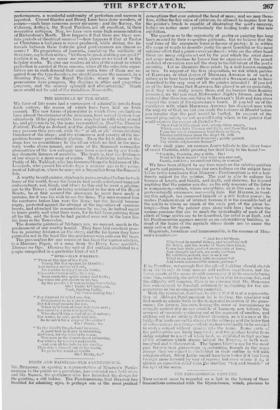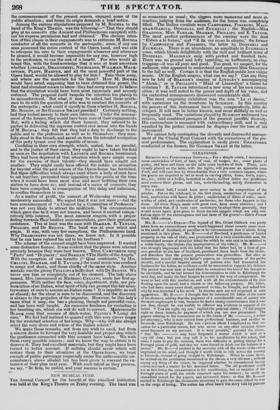THE PROFESSIONAL CONCERT.
Tins concert must be regarded as a link in the history of those transactions connected with the Opera-house, which, previous to the commencement of the present season, engaged some of the public attention ; and hence its origin demands a brief notice. Among the various stipulations; proposed by M. BOCHSA to the band of the King's Theatre, was the following —" That they should play at no concerts (the Ancient and Philharmonic excepted) with- out his express permission had and obtained." The obvious inten- tion of this clause in their engagements was to enthrone M. BOCHSA conductor of all the concerts in the metropolis; since, if any one man possessed the entire control of the Opera band, and was able to interpose his veto to their engagements wherever and whenever he pleased, it would become impossible for any one, however high in the profession, to run the risk of a benefit. For who would at- tempt this, with the foreknowledge that it was at least uncertain whether LINDLEY, DRAGONETTI, NICHOLSON, WILLMAN, MACK- INTOSH, PLATT, HARPER, and all the most powerful part of the Opera band, would be allowed to play for him ? Take these away, and where are the materials for his band? How M. BOCHSA would have acted, supposing him to have obtained this power, the band had abundant reason to know : they had every reason to believe that the stipulation would have been most rigorously and severely enforced. The proposal itself bespoke the intention too plainly to be misunderstood. But what, it may be asked, had these gentle- men to do with the question of who was to conduct the concerts of the metropolis ; what could it signify to them whether M. BOCHSA, Mr. BISHOP, or Sir GEORGE SMART presided ? Certainly nothing, i had they looked merely to their own interests. Under the manage- ment of the former, they would have been sure of their engagements. But, with a feeling which did them honour, they refused to be parties to delivering the supreme control over music into the hands of M. BOCHSA: they felt that they had a duty to discharge to the public and to the profession as well as to themselves : they man- fully stood in the breach, and saved us from the intended usurpation of this petty tyrant over the republic of music. Confiding in their own strength, which, united, has no parallel, and in the justice of their cause, they ought to have taken the field as soon as the negOtiation with LAPORTE and Bocuss. terminated. They had been deprived of that situation which gave ample scope for the exercise of their talents—they should have sought out another. They might easily have offered the public an attraction far beyond what the past season of the Opera-house has furnished. But these difficulties which always exist where a body of men have to act together, prevented their appealing to the public at the time when it would have been most wise and most befitting their own station to have done so ; and instead of a series of concerts, they have been compelled, in consequence of this delay and indecision, to confine themselves to one.
As a matter of profit, the concert of Wednesday evening Was moderately successful. We regret that it was not more ;—but the bare announcement of "a Concert by a Committee of Professors" was not very likely to attract the multitude. The circumstances which gave rise to it were not known, and hence it excited tompa-'' ratively little interest. The most eminent singers, with a proper feeling toWirds Their instrumentalists, gave their gratuitous assistance. This at least was the case with BRAHAM, E. TAYLOR, PHILLIPS, and De BEGNIS. The band was at once select and ample. It was, with very few exceptions, the Philharmonic band. Why DRAQONETTI was not there, we know not. Is it possible that he can have refused his aid to his brethren ? The scheme of the concert might have been improved. It wanted some distinctive feature. It was evident that the pieces were selected precisely because they were best known. Thus, CAMPORESE sung "Parto" and "Di piacer ;" and BRAHAM gt The Battle of the Angels." With the exception of one terzetto (" Qual sembiante," by Mrs. BRAHAM, and E. TAYLOR,) the vocal music was confined to songS and duets, and those chiefly of the same style. Another mistake was the giving PHILLIPS a buffo duet with De BE GNIS. We never saw him so completely out of his element. The lady above named, Mrs. (announced as Madame) CELLINI, made her first ap- pearance. With neither the face, voice, deportment, style, nor pro- nunciation of an Italian, what spirit of folly.can prompt this fair coun- trywoman of ours to assume an Italian name ? It is impolitic as well as absurd; for the cheat is sure to be discovered, and the discovery is always to the prejudice of the impostor. However, be this lady's name what it may, she has a pleasing, though not powerful voice, and has been well taught An excessive fondness for roulading is her besetting sin, which she will do well to correct. nademoiselle Blame sung that essence of ditch-water, PACINI'S Lungi del caro." We feel half inclined to quarrel with this very clever singer for the wretched selection of her songs. Why—why will she always select the very dross and refuse of the Italian school ? We make these remarks, not from any wish to cavil, but from a sincere desire to forward the very laudable and proper step which the gentlemen connected with this concert have taken. We wish them every possible success ; and we know the way to obtain is to deserve it. They had excellent materials, but they might have been turned to better account. If nothing should occur which will restore them to their situations at the Opera-house, we trust enough of public patronage (especially under the unfavourable cir- cumstances above alluded to) has been given to warrant the ex- tension of their plan next year. With such talent as they possess, we say, "Be firm, be united, and your success is certain."



















 Previous page
Previous page